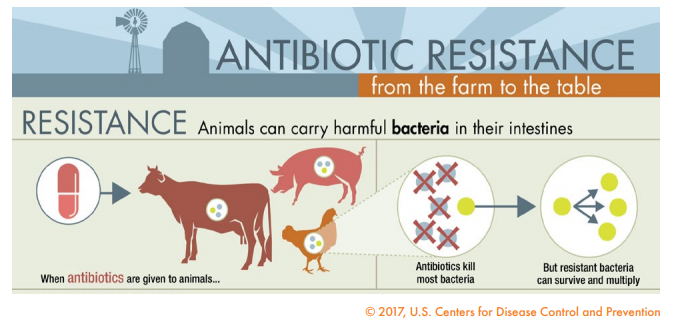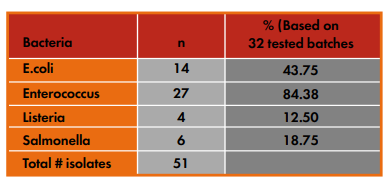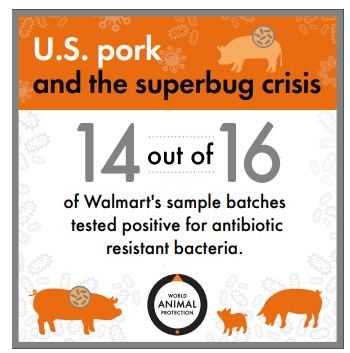Walmart Pork Found To Have “Superbug” Bacteria Resistant To Antibiotics
 By Tyler Durden
By Tyler Durden
A new study published by animal-welfare group World Animal Protection has arrived at some stunning findings about pork products begin sold at Walmart.
The report, published by FoodDive, found that pork samples purchased from Walmart contained “superbug” antibiotic-resistant bacteria. 80% of samples tested from Mid-Atlantic Walmart stores were resistant to at least one antibiotic. Additionally, 37% of the bacteria in the Walmart samples were resistant to three or more classes of antibiotics.
In sum, about 27% of the resistant bacteria found on Walmart’s pork were resistant to classes categorized as Highest Priority Critically Important Antimicrobials by the World Health Organization.
[do_widget id=text-16]
160 samples of pork were tested by researchers at Texas Tech University: 80 were from Walmart and 80 were from a competing national retail chain in the Mid-Atlantic region. The samples were tested in 32 batches for E. coli, salmonella, enterococcus and listeria. Researchers said they found enterococcus in 13 batches, E. coli in 10 batches, salmonella in 6 and listeria in 3 batches.
Alesia Soltanpanah, executive director of World Animal Protection U.S., said:
The presence of multidrug-resistant bacteria on pork products illustrates the role the pork supply chain plays in the global health crisis caused by antibiotic-resistant bacteria. The fact that pork from one of the nation’s largest retailers contains bacteria resistant to antibiotics critically important to human health is particularly alarming and should raise concerns.
In addition to Walmart, researchers also tested pork samples from another national retail chain and also found antibiotic-resistant bacteria. However, the second batch tested did not contain two strains of multidrug-resistant bacteria in a single batch (as the Walmart batch did) and none of the samples were resistant to antibiotics considered “critically important to human health”.
The report didn’t name the second retailer, but FoodDive speculates that it is Costco, Kroger or Target, based on the report noting that the second retailer has “has committed to strengthen its animal welfare policies for its pork suppliers, including working towards a commitment to complete elimination of gestation crates for breeding sows.”
Walmart has not yet made this commitment, while Target and Costco have committed to the initiative by 2022 and Kroger by 2025. In 2016, however, Walmart partnered with IBM and Tsinghua University to track the movement of pork in China using blockchain.
As FoodDive notes, consumers are now challenging major food companies for more transparency with their manufacturing processes:
Food companies are being challenged by consumers demanding more transparency and checking manufacturing processes to make sure the products they buy reflect their values. Younger consumers responding to surveys note how they’re willing to pay premium prices for organic, natural and cruelty-free foods. Both Perdue and Tyson have attracted negative publicity involving animal welfare in recent years and had to change their practices as a result.
Antibiotic-free has become more prevalent as a label claim. Giant Food, a unit of Ahold Delhaize, debuted a private-label pork brand in 2017 with no antibiotics or hormones and 100% vegetarian-fed. And major poultry producers such as Tyson Foods, Pilgrim’s Pride and Perdue have committed to reducing or removing antibiotics from their chicken.
Soltanpanah said the WAP was in contact with Walmart about the results but that the company was “not responsive” to the concerns. Walmart has not acknowledged the problem as of November 26.
These antibiotics – called Highest Priority Critically Important Antimicrobials – are the ones where there are few, or sometimes no, alternatives to treat people with serious infections. The Food and Agriculture Organization of the United Nations has said “antimicrobial resistance poses a serious threat to the safety and quality of feed and food, especially in food-producing animals.”
The Centers for Disease Control calls antibiotic resistance “one of the biggest public health challenges of our time.”
This article was sourced from ZeroHedge.com
Image credit: The Anti-Media
Subscribe for natural health news to your inbox. Follow Natural Blaze on YouTube, Twitter and Facebook.






